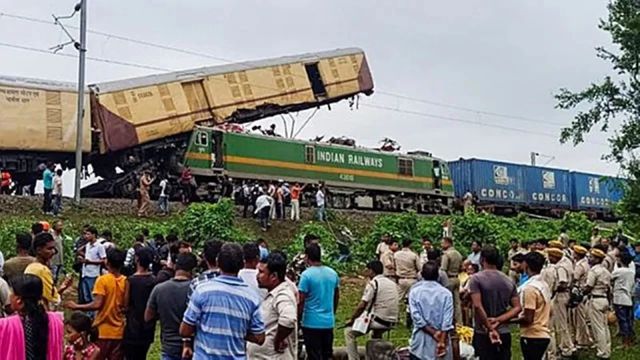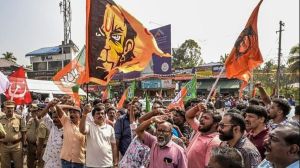Holding station staff to officials at divisional and zonal railway levels responsible, the Commissioner of Railway Safety (CRS) said that the Kanchanjunga Express-goods train collision in West Bengal this June was an “accident-in-waiting” due to “lapses at multiple levels” in managing train operations in the event of “automatic signal failures”, and could have been avoided.
The railway safety body also called for implementation of the automatic train-protection system—KAVACH—on top priority.

On June 17, a total of 10 persons, including the loco pilot of a goods train and train manager of Kanchanjunga Express, were killed after the Sealdah-bound passenger train from Agartala was hit by a goods train from the rear in West Bengal’s Darjeeling district, 11 km from New Jalpaiguri railway station. The accident had also led to injuries to 43 others.
The accident site is in the Katihar Division of Northeast Frontier Railway (NFR).
In its final report, the CRS said that issuance of flawed authority letter to pass the defective automatic signals, non-issuance of caution order, non-availability of critical safety equipment (walkie-talkie), and inadequate counselling of loco pilots and station masters were the major factors behind the accident.
CRS classified the accident under the category of “Error in train working”.
The CRS held that the station master and station superintendent of Rangapani railway station, and chief loco inspector, and traffic inspector of New Jalpaiguri were primarily responsible for the accident.
Story continues below this ad
The report states that the authority letter, which was issued for passing the defective automatic signals, was flawed as it did not have any mention of the maximum permissible speed to be followed by the loco pilot.
“The Authority (letter) was issued to the Loco Pilot without any caution order creating an impression in the mind of the Loco Pilot to pass the signal as per sectional speed. Further it was not signed by the Train Manager and thus, the train manager was not aware of the defective signals in the section ahead. The issue of faulty authority and poor counselling of train running staff and station staff were the major factors for the accident. The non availability of Walkie-Talkie sets has resulted in poor communication between Loco Pilot, Train Manager & Station Master which could have helped in reducing the misunderstanding in train operation. This was an avoidable accident, had the officials of the concerned department followed the prescribed rules/guidelines,” reads the report.
The rail safety body also said that station staff did not have the clarity on how to issue proper authority in the event of signal failures.
The CRS ruled out natural convulsions, intoxication of loco pilot, and negligence, over speeding, or bad enginemanship of loco pilot as a cause or contributing factor in the accident.
Story continues below this ad
“Due to improper authority and that too without adequate information, such an incident was ‘Accident-in-waiting’ and finally occurred on 17.06.2024… It is worthwhile to mention that there have been 275 failure in the auto (automatic signal) section of Katihar division since its commissioning in Jan 2023 till 20.06.2024. The large number of signaling failures in the automatic section is defeating the very purpose of mobility enhancement and causing safety concerns also,” reads the report.
The CRS also found that the inadequate counselling of train operation staff — loco pilot, assistant loco pilot, train manager, and station masters — was also an important contributing factor.
The report also pointed to “a heavy shortage” of walkie-talkie sets in the Katihar Division, where the accident took place, stating that even on the day of the accident, 18 goods train crew were not issued walkie-talkie sets.
In its detailed report, CRS also looked into earlier cases of signal failures and found that a total of 208 incidents of dangerous signal passing occurred in the five years ended March 31, 2024.
Story continues below this ad
“…(of these 208 incidents) 12 cases resulted in collision, highlights the limitation of preventive measures taken by the zonal railways. This underscores the need for the implementation of the automatic train-protection system (KAVACH) on top priority…The large number of signaling failures in automatic signalling territory is a cause of concern and should be taken up with RDSO (Research Design and Standards Organisation) and OEMs (original equipment manufacturers) to improve the reliability of the system,” said the CRS.
In its other recommendations, CRS said: “Crash worthiness features of the passenger coaches shall be reviewed. On priority, at least the last two coaches of every passenger-carrying train should have crash-worthiness features. All new coaches should be turned out with crash-worthiness features and existing coaches shall be retro-fitted during major schedules of coaches.”
It further said that the Railways is in the process of retro-fitment of crew voice and video recording system (CVVRS) in locomotives to record the conversation between the loco pilot, the train manager, and the station master, among others, and it shall be implemented on priority.
CRS started its inquiry on June 19, 2024, which continued till July 11, 2024.
Story continues below this ad
During the inquiry, a total of 52 Railway officials and two non-railway officials submitted their deposition, out of which 34 railway officials were cross examined.
Action taken by the Ministry
The Ministry of Railways said that disciplinary action has already been initiated against all the employees found responsible for the accident as per the recommendation of the CRS Report.
“Employees found to be primarily responsible for the accident have been issued major penalty chargesheets and other responsible employees have been issued minor penalty chargesheets,” said the Ministry in response to the queries sent by The Indian Express.
On the question of steps taken to rectify errors and provide walkie-talkie sets, the Ministry said: “Amendment in the relevant sections of the General and Subsidiary Rules (G&SR) of the Indian Railways has been carried out. Amendment Slip No. 50 has been issued on this railway and the Unified SR as recommended by Railway Board has been implemented…Necessary improvements in the format of the books and forms related to automatic block section working have been implemented so as to remove any ambiguity and clearly lay down the instruction regarding steps to be followed in case of failure of automatic signals.”
Story continues below this ad
“Procurement of adequate numbers of safety equipment including replacement of all defective walkie-talkies has already been ensured. Presently, there is no shortage of any safety equipment across N.F. Railway,” said the Ministry.
It also said that training and counselling of all frontline railway staff, including station masters, loco pilots, loco inspectors, and train managers have been carried out.
































